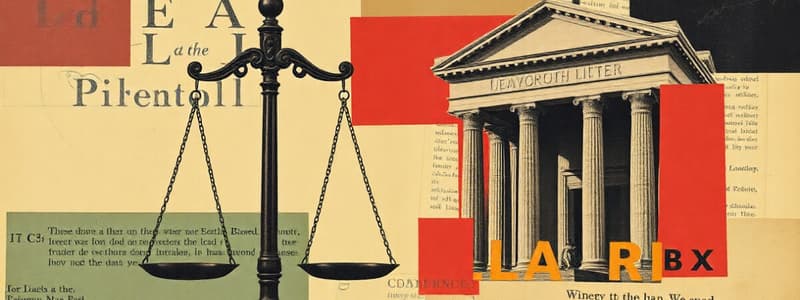Podcast
Questions and Answers
¿Qué tipo de derecho regula las sanciones a delitos y faltas?
¿Qué tipo de derecho regula las sanciones a delitos y faltas?
- Derecho penal (correct)
- Derecho civil
- Derecho tributario
- Derecho eclesiástico
¿Cuál de los siguientes es un tipo de tributo?
¿Cuál de los siguientes es un tipo de tributo?
- Tasas (correct)
- Derecho mercantil
- Derecho civil
- Normas de seguridad
El derecho civil se encarga de regular principalmente:
El derecho civil se encarga de regular principalmente:
- Las relaciones entre el estado y la iglesia
- La vida cotidiana y privada de las personas (correct)
- Las actividades comerciales con entidades estatales
- La imposición de sanciones a delitos
¿Cuál de las siguientes áreas no forma parte del derecho civil?
¿Cuál de las siguientes áreas no forma parte del derecho civil?
El derecho especial se caracteriza por:
El derecho especial se caracteriza por:
¿Cómo se define el derecho común?
¿Cómo se define el derecho común?
¿Cuál de las siguientes afirmaciones es correcta respecto a las contribuciones especiales?
¿Cuál de las siguientes afirmaciones es correcta respecto a las contribuciones especiales?
El derecho mercantil se centra principalmente en:
El derecho mercantil se centra principalmente en:
¿Cuál de las siguientes afirmaciones describe mejor el derecho objetivo?
¿Cuál de las siguientes afirmaciones describe mejor el derecho objetivo?
¿Qué papel desempeñan las normas jurídicas en la organización social?
¿Qué papel desempeñan las normas jurídicas en la organización social?
¿Cómo se define la dualidad humana en el contexto del derecho?
¿Cómo se define la dualidad humana en el contexto del derecho?
¿Cuál es una característica importante de las normas jurídicas según el contenido?
¿Cuál es una característica importante de las normas jurídicas según el contenido?
¿Qué influencia tienen las normas de la antigua Roma en el derecho actual?
¿Qué influencia tienen las normas de la antigua Roma en el derecho actual?
¿Qué implican las normas jurídicas con respecto a la coerción?
¿Qué implican las normas jurídicas con respecto a la coerción?
¿Cuál de los siguientes enunciados describe mejor el sentido del derecho subjetivo?
¿Cuál de los siguientes enunciados describe mejor el sentido del derecho subjetivo?
¿Qué teorizan los sofistas y Rousseau sobre el derecho y la sociedad?
¿Qué teorizan los sofistas y Rousseau sobre el derecho y la sociedad?
¿Cuál es una característica del derecho público?
¿Cuál es una característica del derecho público?
¿Qué fin persigue el derecho privado?
¿Qué fin persigue el derecho privado?
¿Cuál de las siguientes ramas no pertenece al derecho público?
¿Cuál de las siguientes ramas no pertenece al derecho público?
¿Qué función cumple el derecho procesal?
¿Qué función cumple el derecho procesal?
¿Qué se entiende por jurisdicción en el contexto del derecho?
¿Qué se entiende por jurisdicción en el contexto del derecho?
¿Cuál de las siguientes afirmaciones describe mejor a las normas del derecho privado?
¿Cuál de las siguientes afirmaciones describe mejor a las normas del derecho privado?
¿Qué caracteriza al derecho internacional?
¿Qué caracteriza al derecho internacional?
¿Cuál es una característica de las normas imperativas en el derecho público?
¿Cuál es una característica de las normas imperativas en el derecho público?
¿Cuál es la principal característica del derecho natural?
¿Cuál es la principal característica del derecho natural?
¿Quién es conocido por dar un sólido respaldo al pensamiento católico en la Edad Media?
¿Quién es conocido por dar un sólido respaldo al pensamiento católico en la Edad Media?
La justicia natural, según Aristóteles, se distingue de la justicia legal en que:
La justicia natural, según Aristóteles, se distingue de la justicia legal en que:
¿Qué sostiene la doctrina iusnaturalista sobre la relación entre la ley humana y la ley natural?
¿Qué sostiene la doctrina iusnaturalista sobre la relación entre la ley humana y la ley natural?
Durante la Revolución Francesa, la doctrina iusnaturalista:
Durante la Revolución Francesa, la doctrina iusnaturalista:
El derecho positivo se caracteriza por:
El derecho positivo se caracteriza por:
¿Qué principios pueden derivarse del derecho natural racional?
¿Qué principios pueden derivarse del derecho natural racional?
Según el enfoque iuspositivista, el jurista debe evitar:
Según el enfoque iuspositivista, el jurista debe evitar:
¿Qué significa la fuerza en el contexto del derecho?
¿Qué significa la fuerza en el contexto del derecho?
¿Cómo se caracteriza la coacción en el derecho según Max Ihering?
¿Cómo se caracteriza la coacción en el derecho según Max Ihering?
¿Cuál es la noción de 'coercibilidad' en el contexto del derecho?
¿Cuál es la noción de 'coercibilidad' en el contexto del derecho?
¿Cómo se define el derecho como fuerza organizada?
¿Cómo se define el derecho como fuerza organizada?
¿Cuál es una de las funciones del derecho en relación con el ejercicio del poder coercitivo?
¿Cuál es una de las funciones del derecho en relación con el ejercicio del poder coercitivo?
¿Qué se entiende por 'monopolio de la coacción' del Estado?
¿Qué se entiende por 'monopolio de la coacción' del Estado?
¿Qué se busca mantener mediante la coacción en el derecho?
¿Qué se busca mantener mediante la coacción en el derecho?
¿Qué papel desempeñan las instituciones en relación con la autoridad del derecho?
¿Qué papel desempeñan las instituciones en relación con la autoridad del derecho?
¿Qué influyó decisivamente en el desarrollo del estado moderno en el siglo 19?
¿Qué influyó decisivamente en el desarrollo del estado moderno en el siglo 19?
¿Cuál es la principal idea de Rudolf von Ihering sobre el estudio del derecho?
¿Cuál es la principal idea de Rudolf von Ihering sobre el estudio del derecho?
¿Cuál es la principal diferencia entre derecho objetivo y derecho subjetivo?
¿Cuál es la principal diferencia entre derecho objetivo y derecho subjetivo?
¿Qué caracteriza al derecho público?
¿Qué caracteriza al derecho público?
¿Cómo se define el derecho subjetivo?
¿Cómo se define el derecho subjetivo?
¿Qué teoría se opone a la idea del derecho libre en la interpretación judicial?
¿Qué teoría se opone a la idea del derecho libre en la interpretación judicial?
¿Qué aspecto es fundamental en las corrientes sociológicas respecto al derecho?
¿Qué aspecto es fundamental en las corrientes sociológicas respecto al derecho?
Según la teoría de jurisprudencia de intereses, al analizar una ley, se debe considerar:
Según la teoría de jurisprudencia de intereses, al analizar una ley, se debe considerar:
Flashcards
Public Law
Public Law
Rules created by the state to serve the general interest, with the state holding authority over individuals.
Private Law
Private Law
Rules created by individuals to govern their relationships, focusing on specific individual rights.
Public Law Characteristics
Public Law Characteristics
State superiority, general interest focus, public service provision, mandatory rules with public force.
Private Law Characteristics
Private Law Characteristics
Signup and view all the flashcards
Jurisdiction
Jurisdiction
Signup and view all the flashcards
Process (in law)
Process (in law)
Signup and view all the flashcards
Action (in law)
Action (in law)
Signup and view all the flashcards
Branches of Public Law
Branches of Public Law
Signup and view all the flashcards
Taxation
Taxation
Signup and view all the flashcards
Types of Taxes
Types of Taxes
Signup and view all the flashcards
Civil Law
Civil Law
Signup and view all the flashcards
Criminal Law
Criminal Law
Signup and view all the flashcards
Special Law
Special Law
Signup and view all the flashcards
Common Law
Common Law
Signup and view all the flashcards
Private vs. Public Law
Private vs. Public Law
Signup and view all the flashcards
Taxation Types
Taxation Types
Signup and view all the flashcards
Derecho
Derecho
Signup and view all the flashcards
Derecho objetivo
Derecho objetivo
Signup and view all the flashcards
Derecho subjetivo
Derecho subjetivo
Signup and view all the flashcards
Derecho romano
Derecho romano
Signup and view all the flashcards
Ubi societas, ibi ius
Ubi societas, ibi ius
Signup and view all the flashcards
Fuerza coercitiva del derecho
Fuerza coercitiva del derecho
Signup and view all the flashcards
Fenómeno jurídico vs. espontáneo
Fenómeno jurídico vs. espontáneo
Signup and view all the flashcards
Ciencia jurídica
Ciencia jurídica
Signup and view all the flashcards
Coercibility in Law
Coercibility in Law
Signup and view all the flashcards
Law as Force
Law as Force
Signup and view all the flashcards
Legitimate Force
Legitimate Force
Signup and view all the flashcards
Right to Force
Right to Force
Signup and view all the flashcards
Law's Social Control
Law's Social Control
Signup and view all the flashcards
Law and Force Difference
Law and Force Difference
Signup and view all the flashcards
Organized Force in Law
Organized Force in Law
Signup and view all the flashcards
State's Force Monopoly
State's Force Monopoly
Signup and view all the flashcards
Derecho Natural
Derecho Natural
Signup and view all the flashcards
Derecho Positivo
Derecho Positivo
Signup and view all the flashcards
Iusnaturalismo
Iusnaturalismo
Signup and view all the flashcards
Tomas de Aquino
Tomas de Aquino
Signup and view all the flashcards
Justicia Natural
Justicia Natural
Signup and view all the flashcards
Justicia Legal
Justicia Legal
Signup and view all the flashcards
Derecho
Derecho
Signup and view all the flashcards
Ética aplicada al Derecho
Ética aplicada al Derecho
Signup and view all the flashcards
Sociological Jurisprudence
Sociological Jurisprudence
Signup and view all the flashcards
Ihering's Influence
Ihering's Influence
Signup and view all the flashcards
Interest Theory
Interest Theory
Signup and view all the flashcards
Objective Law
Objective Law
Signup and view all the flashcards
Subjective Right
Subjective Right
Signup and view all the flashcards
Public Law
Public Law
Signup and view all the flashcards
Private Law
Private Law
Signup and view all the flashcards
Law's Coerciveness
Law's Coerciveness
Signup and view all the flashcards
Study Notes
Tema 1: Conceptos, Clases y Estructuras del Derecho
- Derecho:
- Fenómeno histórico que cambia con el tiempo y lugar.
- Naturaleza normativa, influenciado por valores sociales y morales.
- Forma de organización social.
Sentidos del Término Derecho
- Derecho objetivo: Conjunto de normas.
- Derecho subjetivo: Facultades que las normas otorgan a individuos, amparadas por el ordenamiento jurídico.
- Ciencia jurídica: Estudio de normas jurídicas.
- Justicia: Condición ideal de ordenamiento jurídico.
1. Noción de Derecho
- Normas romanas: Bases del ordenamiento jurídico occidental.
- Derecho romano: Influencia en las legislaciones (753 a.C. - siglo V d.C.).
- Sociedades necesitan normas: Convivencia y desarrollo individual. Para sobrevivir.
- El derecho es importante para el buen funcionamiento de la sociedad.
- Vida en sociedad: Condiciones naturales de ordenamiento y disciplina.
- Dualidad humana (bondad y maldad): Necesidad de normas para la convivencia.
- Complejidad de la relación humana y la importancia del derecho.
- Sofistas y Rousseau como autores que trataron la relación humana, existencia social y necesidad de derecho.
2. La Fuerza del Derecho
- Norma jurídica con fuerza coercitiva: Para que la norma jurídica sea eficaz.
- Norma acompañada de fuerza coercitiva: Proceso judicial para hacer cumplir las normas .
- Capacidad de coacción inherente al derecho.
Studying That Suits You
Use AI to generate personalized quizzes and flashcards to suit your learning preferences.



